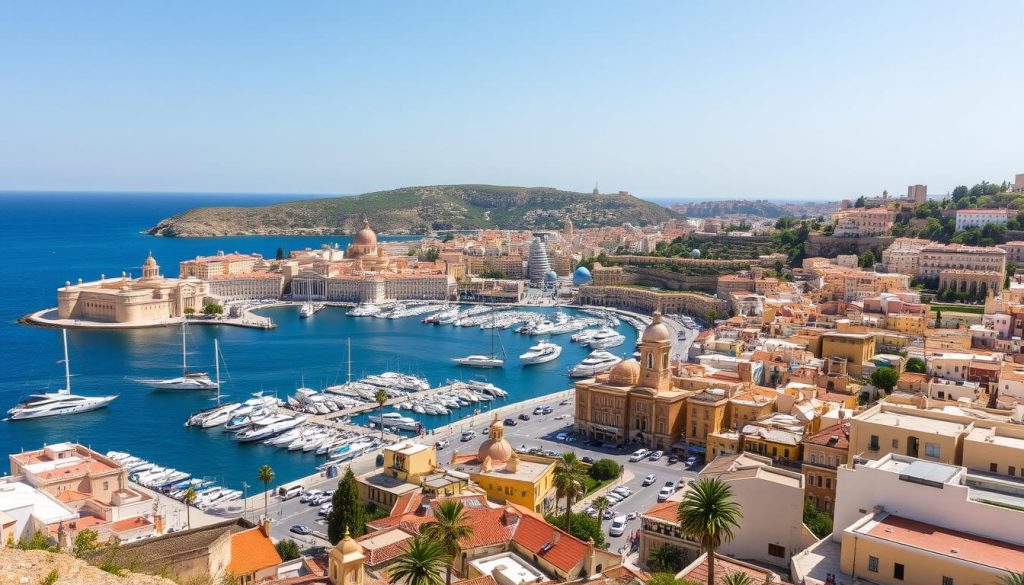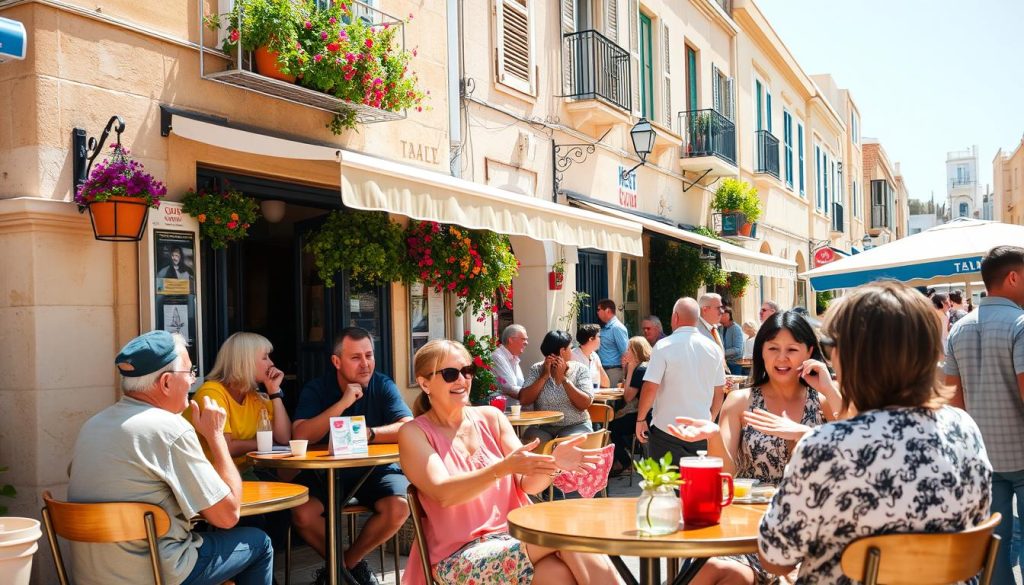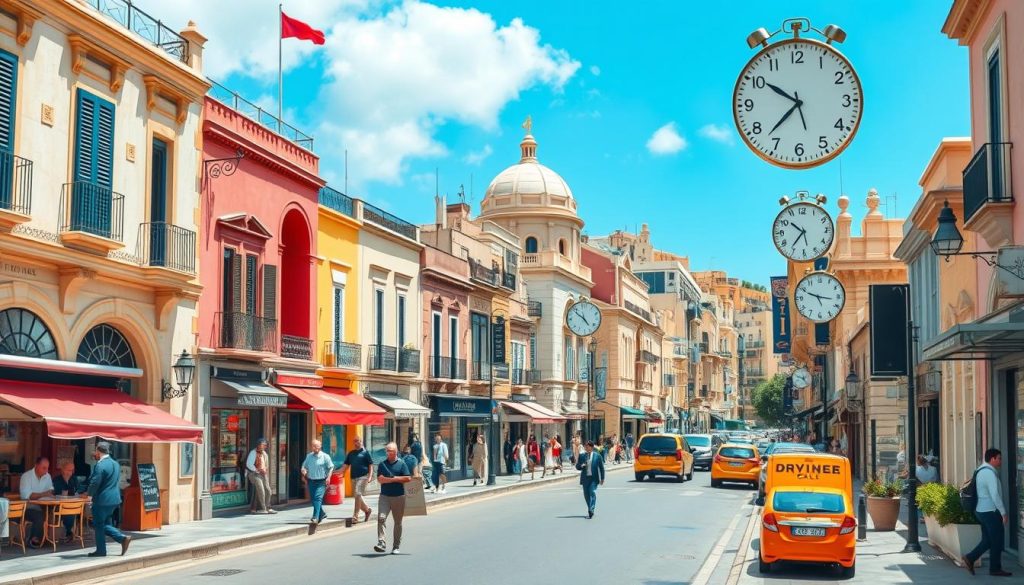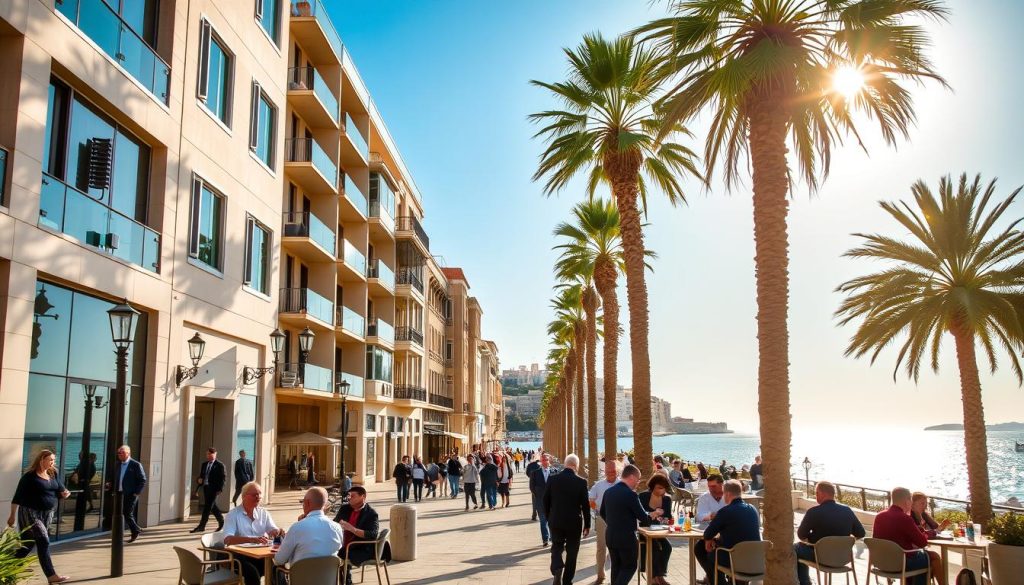In today’s globalised economy, knowing the business culture in Malta is key for UK professionals. It helps them move smoothly through the Maltese corporate world. This knowledge is crucial for successful business interactions and partnerships.
It’s important to grasp the cultural nuances of Malta. This section will give you insights into Maltese business practices. You’ll learn about the etiquette that makes this market vibrant.
The Importance of Understanding Business Culture

Knowing about business culture in Malta is key for UK professionals. It shapes how we work together and talk business. Understanding local customs helps build trust and strong relationships with partners.
Good communication across cultures is all about knowing these differences. By learning about Maltese culture, UK workers can steer clear of misunderstandings. This knowledge makes working together better and more welcoming for everyone.
To thrive in Malta’s business scene, it’s vital to understand the local culture. This knowledge helps in creating lasting partnerships and reaching business goals.
Overview of Malta’s Economic Landscape

The Malta economic landscape is dynamic, with many growth sectors. The Maltese economy has changed a lot in recent years. It has become a lively place for different industries.
Tourism is a big part of the economy, drawing millions to its beautiful beaches and culture. The financial services sector is also strong, thanks to good laws. This makes Malta a great spot for banks, investment firms, and gaming companies.
Information technology is growing fast, thanks to a skilled workforce and government support. This helps to encourage new ideas.
Malta’s location in the Mediterranean makes it attractive for foreign investment. It offers a good business climate with many benefits for international companies. Being part of the European Union also helps, giving Malta access to a huge market.
Business Culture in Malta

The business culture in Malta is unique. It combines different influences and cultural traditions. Knowing these is key to working well with local businesses.
Key Characteristics of Maltese Business Culture
Maltese business culture has a few main traits:
- Strong emphasis on personal relationships, where trust is crucial.
- A mix of formal and informal business practices. Meetings often blend work and socialising.
- A reputation for hospitality, showing Malta’s cultural traditions.
These traits create a special corporate atmosphere. Building rapport is as important as the business itself.
How History Shapes Business Norms
Malta’s history greatly influences its business practices. Past colonial ties and diverse cultures shape today’s business scene. This results in:
- A legacy of adaptability, helping Maltese businesses succeed globally.
- Diverse views leading to new ideas in many sectors.
- Respect for tradition, impacting corporate governance and decision-making.
These historical roots set the stage for how businesses operate in Malta today.
Communication Styles in Malta

Business communication in Malta is a mix of direct and indirect styles. Knowing these styles helps in better interactions and success. In Malta, communication often depends on the situation and the relationship.
Verbal and Non-Verbal Communication
In Malta, people usually speak clearly. But, the situation can add more meaning to what they say. Non-verbal signs like gestures and facial expressions are key. They show feelings that words can’t.
These signs are crucial for showing respect and building trust with business partners.
Importance of Face-to-Face Interactions
Meeting face-to-face is very important in Maltese business. It helps build strong personal connections. Direct talks allow for quick feedback and better understanding.
Face-to-face meetings are essential for successful business in Malta. They help strengthen relationships.
Hierarchy and Structure in Maltese Companies

Maltese companies have a unique structure. They mix old and new ways of working. Many follow a top-down system, where bosses make most decisions. This ensures decisions are made quickly and efficiently.
But, there’s a move towards making decisions together. This change is seen in many areas, thanks to global influences. It’s key for UK workers to understand this shift. Talking openly and getting input from everyone can lead to new ideas and better teamwork.
- Top-down management is common in many traditional businesses.
- New trends are moving towards more inclusive decision-making.
- Good communication across all levels is vital for effective management in Malta.
UK professionals need to get used to the different levels in Maltese companies. Knowing how to work with both hierarchy and teamwork is crucial. It can make a big difference in their success in Malta’s lively business world.
Decision-Making Processes in Malta

In Malta, how decisions are made is key to a company’s success. Businesses often choose between two main ways: consensus culture and authoritative decision making. Knowing these methods helps leaders in Maltese companies make better choices.
Consensus versus Authority
Many Maltese companies use consensus culture. This means everyone agrees and shares the responsibility of making decisions. This approach has several advantages:
- Fosters collaboration among team members
- Encourages diverse viewpoints, leading to well-rounded decisions
- Builds trust and strengthens team dynamics
On the other hand, some companies prefer authoritative decision making. This is when leaders make the final call. It’s useful when quick decisions are needed. The main benefits are:
- Clear direction provided by leadership
- Efficiency in decision-making processes
- Reduced ambiguity for team members
Knowing about these different ways of making decisions in Malta helps UK professionals lead better. Choosing the right approach can improve teamwork and make the company more effective.
Building Relationships and Networking

In Malta, building relationships is key to business success. Personal connections are vital, as trust and rapport are crucial for lasting professional ties. Networking in Malta is unique, with personal bonds often leading to successful partnerships.
The Role of Personal Connections
Building personal connections is essential for business in Malta. It shows respect for local customs and makes negotiations easier. Those who focus on relationship building do well in the Maltese market.
Being genuine and taking the time to know people can lead to great results. This approach benefits everyone involved.
Attending Business Events and Social Gatherings
Going to business events and social gatherings is crucial for growing your network. These events offer chances to make connections and learn about the market. By meeting local professionals, you can build relationships that go beyond just business.
Attending these events helps your organisation become more known in Malta. It boosts your reputation in the business community.
Work-Life Balance in Malta

In Malta, work and leisure are seen as equally important. Employees get great benefits that help them balance work and life. These include flexible hours and lots of holiday time, so they can look after their families and work well.
The work environment in Malta also supports this balance. Companies focus on making sure employees are happy and healthy. They believe that when people have time to relax, they work better. This leads to a strong focus on social activities and helping the community, which is very Maltese.
UK workers moving to Malta need to understand these values. Valuing family and free time helps everyone get along better at work. Getting used to these local views can make job satisfaction higher and work environments better.
Dress Code and Professional Attire

Knowing the business dress code in Malta is key for anyone starting a career here. In the past, formal clothes were a must for big meetings and corporate events. This meant wearing suits, ties, elegant dresses, and clean shoes. It showed respect and professionalism.
Now, Malta is embracing business casual. This mix of comfort and style is becoming more common. It includes smart trousers, dress shirts, and casual shoes. These outfits are perfect for everyday work in Malta.
Understanding these dress codes shows you respect Maltese culture. It helps you build good relationships with your colleagues and clients. Adapting to local norms is very important.
Challenges for International Businesses

Entering the Maltese market comes with its own set of challenges for international businesses. It’s crucial to understand the local culture to avoid obstacles. Misunderstandings in business culture can cause friction between local and foreign firms.
Awareness of stereotypes Malta faces is also important. Recognising these helps in better integrating into Malta’s business scene.
Common Misunderstandings and Stereotypes
International businesses often face specific misconceptions about Malta. These can lead to various challenges in Malta, including:
- Assuming that English fluency eliminates communication barriers.
- Believing that Maltese business practices mirror those in the UK or other countries.
- Overlooking the importance of personal relationships in business dealings.
Stereotypes Malta faces, like being just a tourist spot or having limited professional capacity, can distort views. Understanding Malta’s economy and culture helps in better engaging with local businesses.
To overcome these challenges, cultural sensitivity is key. International firms should educate their staff on Maltese traditions and values. This helps in clearing up misconceptions and creates a collaborative atmosphere for success.
Cross-Cultural Considerations for UK Professionals

For UK professionals in Malta, grasping cross-cultural communication is key. It’s vital for building strong relationships in a new setting. Maltese culture has its own customs and norms, different from the UK’s. These need to be understood for effective teamwork.
In Malta, personal connections are very important in business. A warm greeting sets a welcoming tone. Being friendly opens up networking chances, leading to business success.
Adapting to Maltese culture means valuing informal chats. These conversations go beyond the agenda, building rapport. UK professionals should be ready to share personal stories, boosting trust and understanding.
- Being on time is important, but being flexible with time is also valued in social settings.
- Showing respect for local customs in meetings and events can make a good impression.
- Knowing how family ties affect business is helpful.
By embracing these cultural adaptations, UK professionals can overcome challenges in Malta. Their willingness to learn and adapt will lead to successful communication. This will bring rewarding experiences in Malta’s lively business scene.
The Role of Language in Business Interactions

Language is key in business talks in Malta. Maltese is the national language, but English is the main business language. This mix makes talking between locals and international partners smooth.
English as the Business Language
English is vital in business. Knowing English well helps a lot in talking clearly. It helps avoid mistakes in talks and meetings.
Here’s why knowing the language in Malta matters in business:
- Most business papers, emails, and talks are in English.
- Speaking English well means ideas are shared clearly, cutting down on mistakes.
- Sharing a common language makes networking better.
Knowing the business language in Malta helps build strong work relationships. Good communication leads to successful partnerships. This way, both local and international workers can do well in Malta’s business world.
Future Trends in Maltese Business Culture

The future of business in Malta will see big changes. Globalisation will keep growing, helping Maltese businesses reach out to the world. This change will make local professionals need to be more flexible and adaptable.
New tech is changing how we do business. Automation, AI, and digital tools are now key parts of our work. In Malta, companies are using these to work better and serve their customers more effectively. This mix of old and new ways of working is shaping the business culture.
Also, the workforce is changing. Younger people want jobs that offer flexibility and a good work-life balance. This means companies in Malta will need to rethink how they work and what they offer to attract and keep the best talent.
For those working in Malta, it’s important to watch these trends closely. Being able to adjust to these changes will be crucial for success in the Maltese business world.
Resources for Learning More about Maltese Culture
To get a deeper understanding of Maltese culture, there are many resources for UK professionals. Books like *Malta: A Cultural History* by Eric W. Beckett offer deep insights into the islands’ history. *Understanding Malta: The Complete Guide* is also a great starting point for learning about Maltese society and business.
Online courses on cultural training Malta are also available. Platforms like Coursera and Udemy have courses on Malta’s culture, history, and business etiquette. These courses help professionals connect well with local people.
Local cultural spots, such as The National Museum of Archaeology and The Malta Chamber of Commerce, host workshops and events. Going to these can improve your understanding of Maltese heritage. It also gives you a chance to meet new people. Spending time on these resources will help you do well in Malta professionally.

